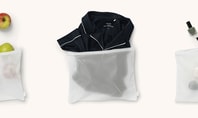The new digital product passport: we make sustainability visible
Nowadays, transparency is more important than ever. Consumers in particular increasingly want to know how and where the products they buy were made, what they are made of and what properties they have – and ideally, they want this information quickly, easily and without arduous research. The new digital product passport (DPP) makes this possible: it shows where a product comes from, what materials it is made of and what sustainability requirements the raw materials meet. As a sustainable underwear brand, CALIDA welcomes this step forward and will be rolling out the DPP throughout its entire product range in 2026. The goal is to make sustainability visible and verifiable.
by CALIDA
July 2, 2025•4 min reading time

The digital product passport reveals origin, materials and sustainability – enabling conscious consumption and future-proof products.
Table of Contents
The key points
The digital product passport will be mandatory for many products in the EU, including textiles, by 2027.
The DPP provides standardised information on origin, material quality, production conditions, etc. available directly on the product page or by means of a 2D code on the label.
Although CALIDA is a Swiss brand and therefore not part of the EU, we will introduce the DPP before 2027. Thanks to the French AGEC Act, you can already find information on the sustainability of our underwear on our French product pages.

How the digital product passport (DPP) works
The digital product passport is an initiative of the European Green Deal for greater sustainability and climate-neutrality. The aim of this innovation is to make the entire supply chain more transparent. Standardised information on product characteristics, countries of origin, etc. should be readily available, enabling consumers to make even more informed purchasing decisions, while all stakeholders benefit from the standardised information.
CALIDA is getting ahead of the game and making the information that will soon be provided via the DPP available today in a similar way: on the French product detail pages, all the relevant information about the respective garment can already be clearly displayed in a pop-up window in accordance with the requirements of the French AEGC law. Customers will soon be able to access this information on the other country websites as well – and also, with the introduction of the DPP, via the QR code on the product label.
Uniform and clear: the information that will be included in the DPP
The EU prescribes what data must be included in the digital product passport, depending on the product category. This standardised information must be machine-readable and accessible to all parties along the supply chain. At CALIDA and in the textile sector, the following information is particularly important:
Countries of origin and production sites
CALIDA manufactures products primarily in Europe. Each collection is designed at our Swiss headquarters in Sursee. Thanks to the digital product passport, the origin of the materials and the production locations are now even more visible: with a single click, customers can see in which country their garment was manufactured and where the raw materials used came from. Thus, ‘Made in Europe’ is no longer just a promise that consumers have to take on trust, but something they can trace for themselves.
Sustainability and quality of materials
Transparency regarding the materials we use is just as important to us as the countries of origin and production. With the digital product passport, information about the fibres and their properties can be quickly captured.
Whether it’s TENCEL™, sustainably grown cotton or our popular wool-silk blend, the DPP provides all information on sustainability labels, biodegradability, recycling options and care instructions, as well as other industry-standard data. This adds real value for consumers in particular, because it makes it easier for them to compare products and brands and to consume more consciously.
What the digital product passport offers you
The digital product passport turns otherwise empty promises and a vague idea of sustainability into a verifiable and honest catalogue of information. As a customer, you can make informed decisions about which garments correspond to your values – and which do not.
Producers, traders and legislators also benefit from the DPP: uniform datasets help to optimise the entire production cycle, enforce quality standards and make the sustainability of products objectively comparable. The DPP doesn’t just benefit consumers, but is a real game changer for the entire industry.
Conclusion
The digital product passport is a milestone on the way to greater sustainability, transparency and responsibility in both online and bricks-and-mortar retail. CALIDA is one of the first brands to consciously follow this path; our French product pages already contain the information required by the AEGC Act, which will also be available via the DPP from mid-2026.
The DPP makes visible what otherwise often remains hidden – for example, where a product and the materials it contains come from and what properties it possesses, such as its recycling possibilities. At CALIDA, sustainability isn’t just a slogan; it’s a promise – and you can prove it with just one click.
Discover more interesting blog posts:


